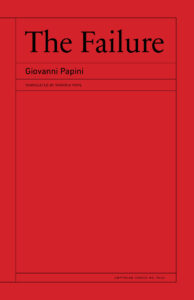
[Sublunary Editions; 2024]
Tr. from the Italian by Virginia Pope
In Jorge Luis Borges’ short story The Library of Babel, mankind exists inside a seemingly limitless library carrying every combination of a 22-character alphabet. The library’s inhabitants believe that among these countless permutations there must exist certain books with priceless information: translations of every novel ever written or to be written; detailed descriptions of the future; the totality of all knowledge. Mankind spends thousands of years desperately searching for these books to no avail, and the desire for omniscience, as well as the certainty of its existence at all, gradually gives way to hopelessness. The library maintains its unyielding infinitude as humanity, unable to make sense of its vast surroundings, tears itself apart.
To conquer the infinitude of all things was the goal of Italian writer Giovanni Papini, who, in aid of this task, dedicated his life to embracing the various avant-garde intellectual movements that flashed through Italy in the first half of the 20th century. Among these movements was Italian Fascism, for which Papini fell into disgrace and was largely written off both within and outside of Italy. Borges, who based his short story, The Other, on a similar one by Papini, referred to him as “undeservedly forgotten” only twenty years after his death. Yet, Papini was an undeniable force in pre-war Italian intellectual life — he helped found several influential magazines lauded for revitalizing a stagnant and inaccessible landscape of criticism. Additionally, his manic espousal of and subsequent disillusionment with schools of thought such as Pragmatism and Futurism reflect the transition of the Italian avant-garde into the juggernaut of Fascism.
As part of its Empyrean Series, dedicated to historically overlooked works of world literature, Seattle-based publisher Sublunary Editions released a new edition of Papini’s 1913 autobiography, The Failure, which recounts Papini’s intellectual odyssey to gain infinite knowledge as a means of “inaugurating a new era in human history.” The particular result of this lofty undertaking is revealed bythe work’s original Italian title, Un Uomo Finito, meaning both “The Finished Man” and “The Finite Man.” Organized into fifty bluntly titled chapters (Chapters 36 and 37 are respectively titled “Am I a Fool?” and “…And an Ignoramus”) describing Papini’s intellectual life from his childhood to his literary success, The Failure reads like a one-sided, overwhelmingly vitriolic conversation with the reader, a captive audience to Papini’s delusions. At times both unabashedly hubristic and humiliatingly confessional, Papini swaggers through life setting impossibly ambitious goals, convincing himself that his genius will allow him to achieve them, and then falling into effusive states of disgrace as he fails to do so.
The first such experiment described in The Failure — performed as a teenager — is to compile a Borges-like encyclopedia of all knowledge. He makes it as far as “Ad” before realizing the futility of this task, seeking instead to compile a summary of History in its entirety. Papini soon gives up this task as well, settling instead to develop a universal history of literature, followed by a universal history of Romance language literature, and finally, a universal history of Spanish literature. This “degeneration of catastrophic rapidity” sets the stage for the rest of Papini’s life:
All my life, even in later years, has been the same — a perpetual reaching out for the Whole, for the Universe, only to fall back to Nothing — to a humble seat on the grass behind a garden hedge. My life has been a succession of vast ambitions and hasty renunciations. This brief account of my boyish efforts is one among the possible explanations of the secret of my life.
Papini’s pattern of attempting sweeping and poorly planned schemes for attaining knowledge and fame began at a young age, and as Papini admits, was partly an intellectual recompense for the emotional and material deprivation of his corporeal life. These conditions are emphasized exhaustively, possibly to justify Papini’s delusions to the reader; the first sentence of The Failure somberly reads: “I was never a child; I never had a childhood.”
Papini was born in Florence in 1881 to a family of impoverished shopkeepers. He could not afford university and remained deeply insecure about his uncredentialed autodidactism throughout his life. The aesthetic hedonism of the contemporary Decadent movement disgusted him, mirroring the gross displays of wealth by the Florentine elite he observed in his youth: “…they stood for poetry, literature, elegance, snobisme, in a word, for that [Decadent] spirit which was beginning about that time to swell the heads and rot the brains of the prematurely senile youth of Italy.” The Failure’s early chapters describe how Papini, ostracized from his peers because of his bookishness, yet unable to find mainstream literary community, often retreated in solitude to the countryside to escape the city’s “holy laws of daily humiliation” and take solace in natural beauty. It was this intense loneliness that led Papini to believe himself separate from and superior to everyone else. Watching other boys play together in the schoolyard, Papini describes his hateful reaction: “it wasn’t envy I felt at such times: it was contempt; it was scorn. My warfare with men had begun even then and there.”
Papini desperately searched for intellectual companionship, eventually meeting Giuseppe Prezzolini, another disillusioned Italian literary critic, in 1899. The two dreamed of forming a “party of intellectuals” that would “burn down everything old in the world.” By 1902, they had formed such a party; by 1903, they released the first issue of Il Leonardo, the most concrete success of Papini’s early life, a magazine dedicated to reorienting philosophy as something “active, creative, taking its part in a necessary reformation of the world” rather than a siloed, contemplative field restricted to Italy’s intellectual elite. The magazine released polemical articles that, among other things, denigrated the lazy, universal acceptance of Positivism and its focus on an empirical basis for knowledge in favor of Pragmatism’s emphasis on action and called for an “intellectual resurrection” within Italy to complete the political and economic awakenings brought about by Napoleon and the Risorgimento.
Papini’s account of Il Leonardo in The Failure reads like a manic upswing from the depressive and lonely fugue of his early life, a crowning achievement that cements his superiority at last. Where a few pages earlier Papini bemoaned the futility of his intellectual endeavors, he now boasts about the “divine messages of glory” and “first strides toward men and immortality” that issue from his own words. Papini’s psychological state mirrors and molds his intellectual one — a temporarily boundless ego that is its own justification for the demiurgic purpose of Il Leonardo, to foment a spiritual renewal of Italy and establish a “Third Rome.”
Papini’s destructive purpose, probably born out of the deep insecurity of his early years, was to not only discover the fundamental truth of things, but in doing so establish himself as superior to everyone else, especially the Italian intelligentsia who shunned him. Arguably, his political desires were just a means to an end, a way of putting one over the status quo under the guise of proto-Fascist rhetoric of renewal. This is demonstrated by the monumental delusion Papini falls into after the shuttering of Il Leonardo — a decision Papini himself made after realizing the magazine would never bring about the action it constantly called for. Of his decision to discontinue Il Leonardo five years after its first issue, Papini writes, “My mind, always astray among boundless ambitions, in comparison with which a bit of printed paper seemed an insignificant ridiculous thing, wandered from my task.”
Following this failure, Papini casts off corporeal pursuits completely and takes his demiurgic impulse to its theoretical conclusion by attempting to attain omniscience, to “increase the power of my will until it became a limitless will, until my spirit could command men and things without recourse to external instruments […] through the renunciation of one’s Self.” This endeavor is probably a result of Papini’s obsession with Max Stirner, whose concepts of Egoism and anarchism he translated into the emancipation of the self to achieve universality; in The Failure’s text, this latest foray into the infinite comes shortly after Papini declares his love for Stirner: “I came across Max Stirner at that time and it seemed to me that I had at last found the only master I could not do without.” To this end, he ventures down several increasingly dubious paths: he tries to reconstruct the art of the miracle through meticulous study of Catholic texts and seeks out mysticism as an “abdication of the particular,” experimenting with breathing exercises he claims to have learned from a group of people he calls “Indo-Yankee Yogees.” Papini’s intellectual frenzy during this period reached such an extent that in 1906, a doctor ordered him to cease all literary activity in the interest of his health.
Of course, Papini is unable to achieve omniscience, but his greatest regret appears not to be a purely intellectual or theoretical one — it’s that some personal fault unknown to him, one he has carried since childhood, was instrumental in his failure to gain universality: “I was a monster — an unhappy, ungainly monster. Pale, weak, bashful, self-conscious…here lies a man, who tried to be God — and failed!”
Many of Papini’s intellectual forays on the route to Fascism similarly connect his personal delusions to theory. His self-assuring proclamations of superiority to all other men can be seen as the basis for his embrace of Mussolini-admired Vilfredo Pareto’s “circulation of elites” theory, which argues that regime and social change occurs only as one elite is succeeded by another. And his longing for a like-minded community, combined with his failure to achieve universality alone, led Papini toward a communal, or nationalist, strategy for societal resurrection: “First the whole world was in me. Later I found myself alone and almost without life. To get my strength back again, I had to get a new hold on that bit of earth to which I was most closely placed and related.” Taken together, these attitudes provide an ideological basis for Fascism as it took hold in Italy nearly a decade after The Failure was published.
The latter of these also sheds light on a link between Papini’s radical individualism and his eventual embrace of the communal aspect of Fascism. Papini interprets the logical conclusion of radical individualism to be omniscience, and his failure to achieve it gives way to the more pragmatic realization that by serving and elevating the state, an individual may himself be elevated beyond the concept of that state. So long as he is acting in his own self-interest, any outward subservience to the totalitarian apparatus is not necessarily in conflict with Papini’s radical individualism. As Papini writes: “I saw no other purpose worthy of attainment than a complete emancipation of myself—and others. (For, of course, to demand freedom myself I had to concede it to others.)” Fascist collective liberation is simply another means for Papini to pursue his individualist megalomania.
The Failure reads as an internal monologue of Fascism, a behind-the-scenes look into avant-garde intellectual output that reveals the emotional turmoil underlying the essays, treatises, and manifestos so often lauded for their theoretical precision, even as they are condemned politically. Its abject confessionalism also furthers the argument put forth by novels written in fascist contexts, such as Alberto Moravia’s The Conformist or nearly anything by Yukio Mishima — that fascism (in Italy and elsewhere) both in theory and in practice is little more than an outward reflection of internal insecurities, a desperate and violent attempt to impose upon the real world an inevitably futile vision intended for theory alone. As authoritarian ideologues and technocrats are today propagating atop ham-fisted platforms espousing righteousness and megalomania, The Failure lays forth with painful and pathetic sincerity the doubts and delusions that plague these characters as well. Still, rather than find in them kindred spirits, the ever-vitriolic Papini would probably have described them as he did many of his seemingly like-minded contemporaries: “slow, heavy, somnolent, vulgar, physical, and hellish.”
Naveen Rajan is from Austin, Texas and lives in New York. His writing has appeared in The Drift, Hobart, Bright Lights Film Journal, and Apocalypse Confidential.
This post may contain affiliate links.






